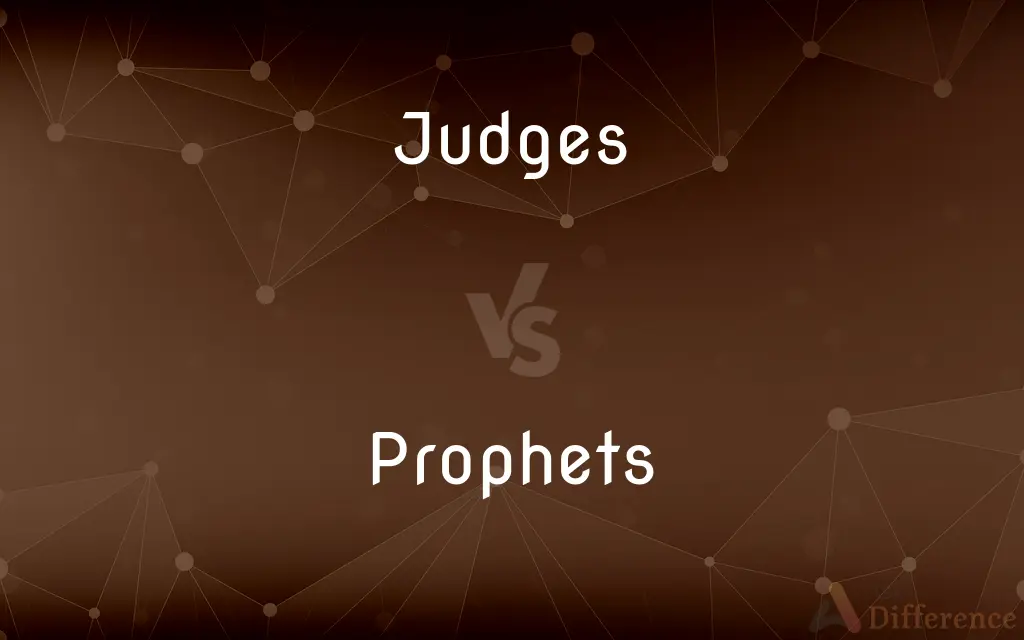Judges vs. Prophets — What's the Difference?
By Maham Liaqat & Urooj Arif — Updated on April 1, 2024
Judges were leaders in ancient Israel who served mainly in military and judicial roles, while prophets were messengers of God focusing on spiritual guidance and prophecy.

Difference Between Judges and Prophets
Table of Contents
ADVERTISEMENT
Key Differences
Judges in ancient Israel held a role combining military leadership and legal arbitration, tasked with delivering Israel from foreign oppression. On the other hand, prophets served as God's spokespeople, delivering messages, warnings, and guidance to the Israelites, often focusing on moral and spiritual issues.
Judges, such as Deborah and Gideon, were pivotal during a time when Israel lacked a centralized government, providing leadership in times of crisis. Prophets like Isaiah and Jeremiah, however, emerged even during the reigns of kings, critiquing the society and calling for repentance and adherence to God’s laws.
The authority of judges was often localized and arose out of necessity, with their leadership ending once peace was restored. Whereas prophets claimed their authority directly from divine visions or commands, their influence spanning beyond any temporary crisis.
Judges' stories are primarily recorded in the Book of Judges, showcasing their military exploits and judicial decisions. In contrast, prophets have their messages and stories spread across various books of the Bible, including those named after them, like Isaiah and Jeremiah, highlighting their prophetic declarations and interactions with God.
While judges were instrumental in immediate, practical deliverance and governance, prophets dealt with the spiritual and moral direction of the nation, often warning of long-term consequences of disobedience to God.
ADVERTISEMENT
Comparison Chart
Main Role
Military leadership and judicial authority
Delivering God’s messages and prophecies
Historical Context
Emerged during times of crisis before Israel had kings
Active throughout Israel's history, including during monarchies
Authority Source
Leadership arose out of necessity
Claimed authority directly from God
Primary Focus
Deliverance from oppression, legal disputes
Spiritual guidance, moral and ethical teaching
Examples
Deborah, Gideon, Samson
Isaiah, Jeremiah, Ezekiel, Daniel
Compare with Definitions
Judges
Judges were leaders who delivered Israel from its enemies.
Gideon led a small army to victory with God's guidance.
Prophets
Prophets conveyed messages from God.
Isaiah warned Judah of coming judgment unless they returned to God.
Judges
They also settled legal disputes within communities.
Deborah was known for her wisdom in judging cases.
Prophets
Their role was to guide the moral and spiritual direction of Israel.
Hosea called for repentance through his own life experiences.
Judges
Judges acted during a specific historical period before the establishment of monarchy in Israel.
Samuel is considered the last judge before the rise of kings.
Prophets
They performed symbolic acts to illustrate their messages.
Jeremiah wore a yoke to symbolize subjugation.
Judges
Judges were often military leaders.
Samson fought against the Philistines using his extraordinary strength.
Prophets
Prophets could predict future events.
Daniel interpreted dreams that foretold future empires.
Judges
Their leadership was temporary and situational.
Once peace was restored, a judge's role would diminish.
Prophets
Prophets wrote books of the Bible.
The Book of Ezekiel contains visions and prophecies given to him by God.
Judges
To form an opinion or estimation of after careful consideration
Judge heights.
Judging character.
Prophets
A person who speaks by divine inspiration or as the interpreter through whom the will of a god is expressed.
Judges
(Law) To hear and decide on in a court of law
Judge a case.
Prophets
One of the highest-ranking leaders of the Mormon church, considered by the faithful to be divinely inspired, and responsible for establishing and revising doctrine.
Judges
To pass sentence on; condemn.
Prophets
A person gifted with profound moral insight and exceptional powers of expression.
Judges
To act as one appointed to decide the winners of
Judge an essay contest.
Prophets
A predictor; a soothsayer.
Judges
To determine or declare after consideration or deliberation
Most people judged him negligent in performing his duties as a parent.
Prophets
The chief spokesperson of a movement or cause.
Judges
(Informal) To have as an opinion or assumption; suppose
I judge you're right.
Prophets
Prophets (used with a sing. or pl. verb) The second of the three divisions of the Hebrew Scriptures, comprising the books of Joshua, Judges, Samuel, Kings, Isaiah, Jeremiah, Ezekiel, and the Twelve. Used with the. See Table at Bible.
Judges
(Bible) To govern; rule. Used of an ancient Israelite leader.
Prophets
Prophet One of the prophets mentioned in the Bible, especially one believed to be the author of one of these books. Used with the.
Judges
To form an opinion or evaluation.
Prophets
Prophet(Islam) Muhammad. Used with the.
Judges
To act or decide as a judge.
Prophets
Plural of prophet
Judges
One who makes estimates as to worth, quality, or fitness
A good judge of used cars.
A poor judge of character.
Prophets
The second of three divisions of the Hebrew Scriptures
Judges
(Law) A public official who hears and decides cases brought in court.
Judges
(Law) A public official who hears and decides cases or matters in a forum other than a court, such as an administrative proceeding.
Judges
One appointed to decide the winners of a contest or competition.
Judges
A leader of the Israelites during a period of about 400 years between the death of Joshua and the accession of Saul.
Judges
Judges (used with a sing. verb) See Table at Bible.
Judges
Plural of judge
Judges
A book of the Old Testament that tells the history of Israel under the leaders known as judges
Common Curiosities
What is the difference between a judge and a prophet?
Judges primarily provided military leadership and resolved disputes, while prophets delivered messages from God and focused on spiritual matters.
What was the role of prophets in the Bible?
Prophets were messengers of God, focusing on delivering divine messages, guiding spiritual life, and prophesying future events.
Can someone be both a judge and a prophet?
Yes, some figures in the Bible, like Samuel, served both as a judge and a prophet.
Who were the judges in ancient Israel?
Judges were leaders who served both military and judicial functions, guiding and protecting the Israelites before the establishment of monarchy.
How did judges come to power?
Judges arose in times of need, often chosen by God to deliver Israel from oppression.
How were prophets chosen?
Prophets were called by God, receiving their authority through divine revelation or visions.
Did judges write any books of the Bible?
The Book of Judges, which recounts the deeds of several judges, is attributed to their era, but not directly written by the judges.
Did all judges have military roles?
Most judges had military roles, leading the Israelites against their enemies, though some, like Deborah, also had significant judicial roles.
What is an example of a prophet's message?
Isaiah’s call for repentance and warning of consequences for Israel’s sins is an example of a prophetic message.
Were there any female prophets?
Yes, the Bible mentions female prophets, such as Deborah and Huldah.
Who are some well-known prophets?
Isaiah, Jeremiah, Ezekiel, and Daniel are among the well-known prophets with books named after them.
How did people respond to the prophets' messages?
Responses varied; some heeded the warnings and repented, while others ignored or even persecuted the prophets.
How did the roles of judges and prophets differ in their impact on Israel?
Judges primarily impacted Israel through direct leadership and deliverance from enemies, while prophets had a long-lasting influence on the spiritual and moral direction of the nation.
What was the main message of the prophets?
The main message often revolved around returning to God, obeying His laws, and warnings about the consequences of disobedience.
What kind of prophecies did prophets make?
Prophets made various prophecies, including foretelling the coming of the Messiah, future judgments, and the restoration of Israel.
Share Your Discovery

Previous Comparison
Hayseed vs. Rube
Next Comparison
Topup vs. RechargeAuthor Spotlight
Written by
Maham LiaqatCo-written by
Urooj ArifUrooj is a skilled content writer at Ask Difference, known for her exceptional ability to simplify complex topics into engaging and informative content. With a passion for research and a flair for clear, concise writing, she consistently delivers articles that resonate with our diverse audience.












































